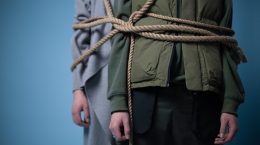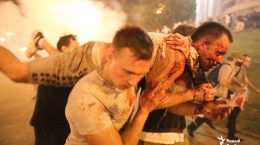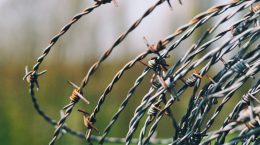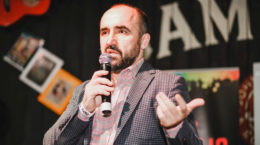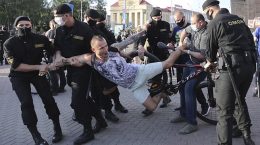ICCI “Our House” continues a series of reports under the general title “Letters from OTC”. In these letters, the prisoners of these inhumane institutions themselves recount their survival on the edge. In the first report, we brought to your attention the stories of prisoners about how they are often deliberately left without urgent and routine medical care. Today you will learn about the conditions in which they were doomed to live by the illegal and inhumane government of Belarus.
Republic of Belarus, City of Novogrudok, Grodno region, OTC No. 5. Our days
“When a person ends up in an OTC, he is humiliated, deprived of basic rights and freedoms, normal food and medical care. Deprivation of liberty as such leads to deformation of the individual, and the constant oppressive feeling of injustice pushes in the future to real criminal offenses.”
- Quarantine
All newcomers for “treatment” at the OTC end up in the so-called “quarantine”. Formally, this is necessary to examine a newcomer, in fact – to suppress morally.
“If you look at this building from the outside, the only new thing is the plastic windows. But even they do not save you from mold inside. I had to be in quarantine for the first 14 days. By the way, according to the law, you can take necessities, underwear, shaving things, etc. to an OTC. I was not given that. Moreover, there was a command not to accept things from my wife. They checked me for lice, shaved my head, did not allow me to wash, they said I was clean, even though I spent three days in my clothes in the Kobrin TDF.
“Everyone just sits in quarantine, there is absolutely nothing to do. Wake up at 5:30, bedtime at 21:00. Employees come to check. People are forbidden even to look through the windows, which already overlook the territory of the zone. Before the lights out, the formation is carried out on the street. 2–3-meter metal fence made of thin rods. You stand and wait for an employee to come to check. In this state, you wait 40-50 minutes in the cold. Then an employee comes, who reads out the names in order, and you wait for yours to be called. Then you, freezing to death, go into quarantine and cover yourself with a blanket without undressing.”
- “Prophylactic registration”
“Then I was transferred to Unit 2. After my transfer, it was announced that I would be put on a preventive register – I had to go to the checkpoint every two hours and “check in”. I was given a cardboard card with my photo, name, unit number and, in red letters, my profile: “Prone to extremism and other destructive activities”.
People prone to suicide have a category number 3, those prone to escape have a category number 5. Preventive register starts at 8:00 and ends at 20:00. If you are even a minute late – a violation. I was late once, but the controller forgave me, saying he will report me next time.
When you go to the checkpoint, you wait for the controller to come out and you say to him: “Hello, citizen warden! [Full name], the beginning of the term…, the end of the term…, category №8, has arrived to check in!”. And so, every two hours.”
- “Offences” and penalties
There is a whole sophisticated and bullying system of all sorts of “violations” in such institutions. The punishments for them range from an isolation ward to an extension of the term of detention in an OTC, up to a maximum of two years. This is what the prisoners of the inhumane preventorium have to say about their sophistication and absurdity.
“You can get an offence for anything. For not shaving for more than one day. For walking through the territory without taking your hands out of your pockets, even in frost. For the fact that there are two mugs in the nightstand, not one. For a needle and thread, for nail scissors. For not seeing an employee and not saying hello: “Hello, citizen boss!”, whereby “good afternoon” or “good evening” cannot be said. For falling asleep on the bed. Even for the fact that the book will lie on the windowsill, and not in the nightstand.
If there is one violation, you do not go on parole. For an offence, if the supervisor so wishes, you may be sent to the disciplinary room, as the management calls it. The number of days spent there depends on the head of the OTC. There were those who didn’t come out of there for three months.
The person in the isolation ward is undressed and given a cotton sheet. Then they make heating to a minimum. There is a battery in the isolation ward, to keep warm, the person leans against the battery. A second violation is given for this. For two violations, the administration gives an additional term: from one to six months. The judge arrives, the court is held on the territory of the OTC in the club building. The administration motions for an addition to the term and the judge obediently executes.
Everything inside is concrete. The bed (bunks) after the morning rise is fastened to the wall. The bench and table are built into the floor. Inside is a CCTV camera. I can get an offence for sitting on my bed right now writing you a letter, too!”
- “The Unbearable Lightness of Being”
“Ten units have been formed so far; the OTC is being replenished every week. The unit is divided into “sections” (rooms). There is a bed, bedside table, and stool. There is a TV in the corridor which only shows the channels that are “necessary”. There is no hot water, only cold water from a well.
Dampness, curtains or tulle are prohibited in the sections. In the fourth unit section there was an icon hanging, the “squad officer” (the OTC officer in charge of the unit) was in a bad mood, hit a man, smashed his nose, stomped on the icon, and then ran outside, pulled himself by his shoulder straps and reported the “attack on the officer” over the radio. As a result, the man was added several months to his term after the isolation ward.
“There is a separate room with sockets that opens on schedule. Only there you can boil water for tea or coffee. Those who work the second shift are out of luck. People who work from 17:00 and finish at 00:00 will not be able to drink anything but tap water.”
“Wake up in the units at 5:30 a.m. At 6:00 the formation for verification. One unit officer checks two units at once, which is about two hundred people so far, so the check lasts about 30 minutes. We store our belongings in a specially designated room, which opens at 7:00 am for one hour and at 19:00 for the same time. Those who work in the second shift cannot get into it.
A limited number of things can be stored in the nightstand: personal hygiene products, a mug, cigarettes and food, but only if it is sealed (Rolltones, sweets). Watches are also forbidden in the section. You can only wear wristwatches, and indoor ones are prohibited. After washing, clothes are dried only on the street, on the clothesline.
Cockroaches in every section and in every unit. From time-to-time people pick up lice. Then with the mattress and clothes, the person goes to ‘frying’ (a method of destroying parasites by exposing fabric objects to high temperatures – Editor’s note).” Ed.) “.
“We are forced to shave every day. If you have a hint of stubble, then this is a violation – and you will not go to parole. I will never forget – I tried to shave, the water is icy, tears from my eyes. The razor was pulling out more hair than it was shaving. The guys also found soap and slippers for me. But no one dared to wash in such water. We washed our feet at the most.”
Needless to say, in any civilized country, the moment any of the facts outlined here were made public, everyone involved would immediately go to prison, from the very last ” unit officer” to the head of the regional interior ministry?
- Meal’s ready!
Apologies in advance for possibly spoiling one’s appetite, but just imagine: an appetite is spoiled just by reading the text, and people are fed with it! And there is no alternative to this: access to personal belongings and products, as mentioned earlier, is strictly limited by the administration of the OTC.
“On the first day of eating, I was shocked, to say the least. There are tables in the quarantine, you are given aluminum bowls and mugs, which look from the 80s. They serve a first course for breakfast, a first course for lunch and a second course for dinner. For dinner, only the second. There are no forks, they eat only with spoons, and then with their own, but I did not have a spoon.
The menu is as follows: cabbage or beet soup, mashed potatoes or pearl barley porridge in water mixed with flour. For the second course, they serve cabbage with water. Lunch leftovers are then mixed with potatoes and given for dinner. Some kind of meat is added that looks like long threads mixed with bones and chunks of fat.
They also sometimes give boiled eggs, one per person, and in quarantine – a small piece of butter. When you are transferred from quarantine to the unit, you don’t get butter anymore. For each meal, bread is given: a piece per person.”
“Today, the prosecutor’s inspection came, so every corner of the “zone” was washed, and in the canteen, in the corner, they put scales. Food was placed on the plates nearby, the weight (the norm per person) was signed on the plates, and a piece of meat similar to veal was put in one of the plates. The food ration does not correspond to the weight, they simply add water to increase the weight. There are no salads on the menu.”
“Once there was an incident in the cafeteria: during lunch, a man in a soup came across a whole boiled mouse. The whole unit refused to eat, and we were left without lunch. Two units are allowed into the canteen. The floor is constantly greasy, I have slipped a couple of times myself. 29 tables that are wiped down with 2-3 cloths. The tables are constantly greasy, as is the floor. I can’t convey the smell”.
“A little later I learned: when you eat, it is better not to look at what falls into the spoon. You blindly scoop and swallow. Rotten potatoes and lumps of fat come across. Previously, pigs were raised on the farm, and often in the potatoes one could find both pig’s eyes and teeth.”
“After eating, you take your bowl and go to the washbasins to wash it. There is no hot water. You simply smear this grease on the walls with your fingers, and then you step away from the sinks and go to a large saucepan full of water mixed with bleach. You put a bowl in there for a couple of seconds, take it out and put it in a dirty potato sack. Then, at the next meal, they take a bowl out of there – any bowl, understandably – and the process repeats.”
- Find your right in the fight or “get into the system”?
The nightmarish system of OTCs in Belarus, as described by the unfortunates there, was spawned by the more global system called “Lukashenko’s rule” and is a scaled-down copy of it. There are also those who “joined the system”, there are those who fought with the system and continue to fight even in the described inhuman conditions.
“People showed interest in me, asked me about politics, about the events in the country. There is an information vacuum here. The mood is the same: “…nothing will change, nothing has changed for 26 years…”.
I began to tell them about where we are: that this is a violation of all possible human rights. But the answer was often: “You yourself will not change anything here, especially since you yourself are here.”
There were those who came out, wrote to the prosecutor’s office, and complained about the hotline. But nothing has happened, no commission, no prosecutor, no calls to the hotline can change something that generates revenue for the treasury as well and which allows to line the pockets of not only the OTC management”.
The second reason why nothing happens is fear. Many, having freed themselves, try to forget this place, do not want to talk about it, realizing that if they write somewhere, the district police officer will find a dozen reasons to send them here again.”
The fascist administration is trying to hide its crimes, “writing off” broken people as unnecessary trash. In the unit, I learned that they “write off” dead people. In less than a year, five people died here. One hanged himself in the industrial zone, another opened his veins, the third died in his sleep. The fate of two more is not known to me.”
“A couple of times even one of the two payphones was turned off. They are afraid and try to ensure that information does not pass through the field or telephone inside the institution.”
“I want everyone to hear that in Belarus, in a European country, slavery is flourishing, human trafficking is flourishing! It thrives behind high fences with barbed wire, thrives behind the veiled name “occupational therapy center”. The fact that we have such a punitive instrument as OTC in a country with a population with a high level of culture and education is a cause for concern and wariness.”
“Living in the 21st century in a European state, it is difficult to imagine that people can be imprisoned for up to 2 years for administrative offenses. The punitive tool – OTC – is used by the regime against political opponents: activists, bloggers and ordinary people who disagree with the rigging of elections, the strangulation of civil society, and the strengthening of Lukashenko’s personal dictatorship.”
Our struggle is not fruitless. Criminals are afraid of publicity; they are afraid of discussing their crimes in society.
“Many violations were committed against me: they did not give out letters, parcels, there were attempts to refuse a meeting with relatives. Now the management has started to behave more cautiously, more circumspectly.”
The editorial team of ICCI “Our House” and the people inside the OTC are actively working to get the following material ready for publication as soon as possible. We will tell you about the slave labor of the OTC prisoners, about the “special” treatment of those caught behind these fences for political reasons. We will also talk about large-scale corruption schemes debugged within the system. We ask you to share this publication on your social networks or just show it to your friends. After all, many do not even know what is hidden under the ominous abbreviation “OTC”.



